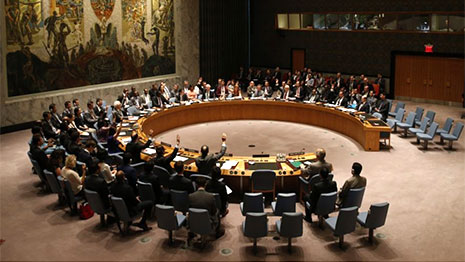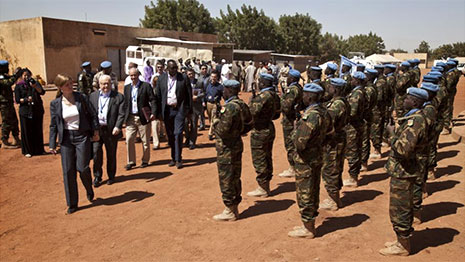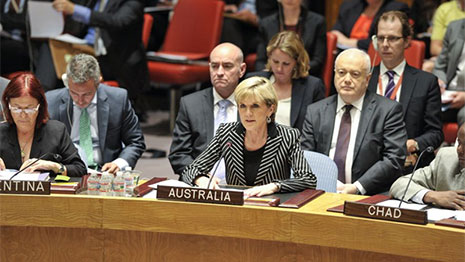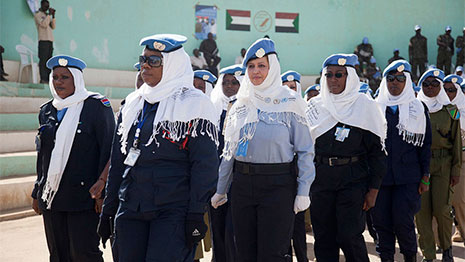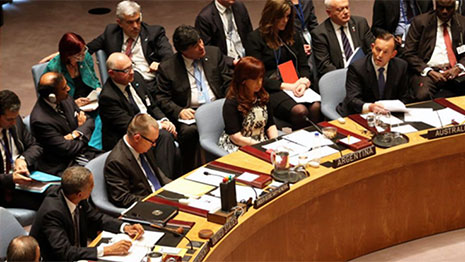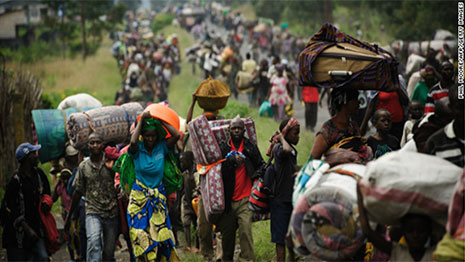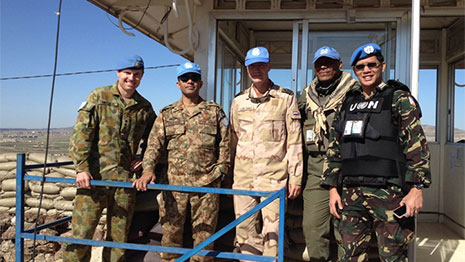International relations
Summary
Over its two-year term as a temporary member of the UN Security Council, Australia met its commitment to serve with distinction.
Australia established a strong reputation as an active, pragmatic, and outcomes-focused Member of the Council. This hard-fought and well-earned reputation was based on our ability to build consensus for action to address highly complex security issues and in support of our direct national interests. Australian leadership of the Council's response to the downing of Malaysia Airlines flight MH17 was a prominent example. Our performance ensured Australia left the Council at the end of 2014 with a strong record of achievement.
Australia put the need to protect civilians and establish robust humanitarian responses to conflicts at the forefront of decision making by the Council. Australia worked to make peacekeeping missions mandated by the Council more effective, including through a new focus on the contribution that policing can make to building sustainable peace in conflict-affected societies.
Australia brought an innovative approach to the work of the Council. It took ground-breaking initiatives which enabled the UN to respond more effectively to the humanitarian crisis in Syria, strengthened international cooperation to counter terrorism by recognising the important link with countering violent extremism and improved the implementation of sanctions. Australia ensured peacekeeping missions in Africa were mandated appropriately to meet the peace and security challenges facing the African continent. It led the Council in managing the transition in Afghanistan from the NATO-led combat mission to Afghan security control. Australia worked tirelessly to bring new issues to the attention of the Council, including the appalling human rights situation in the Democratic People's Republic of Korea. Australia also authored and led negotiations on a resolution on small arms and light weapons, the first of its kind.
Australia's membership of the Council has not only enhanced its reputation as a country which can make a serious and substantive contribution to global peace and security, it has also enabled Australia to strengthen relationships with many of its key allies and strategic partners. Australia brought perspectives from the Indo-Pacific region to the Council's work and ensured countries from its region stayed closely engaged with Council decision-making.
Serving with distinction at the world's top table on international peace and security matters has enhanced Australia's international influence and reputation and advanced its broader national security interests.
The security environment
Australia's term on the Council coincided with a time when the global security environment became increasingly dangerous and complex. The world now faces a larger number of simultaneous security and humanitarian crises with a broader impact than at any time since the Second World War. Understandably, the UN system is showing signs of strain given the scale and complexity of global challenges and as the number of people directly affected by conflict around the world continues to rise. This has been compounded by a tight fiscal environment for many UN Member States, constraining international capacity to support the UN's response to multiple crises.
In this environment, the international community has continued to look to the Council to exercise its responsibilities under the United Nations Charter for the maintenance of international peace and security. The Council is busier than ever, meeting more frequently than ever before, with more peacekeepers deployed than ever and the number of sanctions regimes in place at an all-time high.
As has been the case since the founding of the United Nations, relations between the Permanent Five members of the Council – China, France, Russian Federation, United Kingdom and the United States – are key to determining outcomes in the Council. Divisions between the Permanent Five over Syria in 2011 and 2012 – which led to inaction with dire consequences for regional and global security – cast a long shadow over the Council when Australia commenced its term in January 2013.
Despite this, the Council was able to reach consensus on a majority of decisions during Australia's term. This included the Council's response to multiple, simultaneous conflicts in Africa and the Middle East, as well as its contribution to counter-terrorism, non-proliferation, peacekeeping, and to advancing the protection of civilians caught up in conflict, especially women and children.
We saw during Australia's term that when the Council acts decisively and remains vigilant – as it did in response to the horrific chemical weapons attack in Damascus and the fall of Goma in the Democratic Republic of Congo (DRC) – it can make a real difference.
The limitations of the Council in situations where one of the Permanent Five is directly involved in a conflict was made apparent by the Ukraine crisis in 2014 – a situation which posed a direct threat to the collective security system established by the Charter but one to which the Council could not respond effectively given the use of the veto by one of the Permanent Five.
Australia demonstrated consistently throughout its term that elected members can use Council membership to advance the Council's work and achieve outcomes that make a substantive contribution to the maintenance of international peace and security. Australia did this in line with its national interests and values and in close cooperation with its key partners on the Council.
Key achievements
Australia used its Council term to drive a strong international response to the downing of Malaysia Airlines flight MH17 over Ukraine on 17 July 2014 – an incident in which 38 Australian citizens and residents were killed. In the immediate aftermath of the crash, Australia authored and led negotiations on UNSC Resolution 2166 – adopted unanimously on 21 July 2014 – which condemned the downing of flight MH17. At Australia's insistence, the resolution called on separatists at the crash site to ensure the bodies of the victims were treated with dignity and respect. The resolution also underlined the need for a full, thorough and independent investigation into the crash and demanded all military activities in the area cease to enable access to the site.
Resolution 2166, adopted just days after the crash, has been the only Council resolution on Ukraine since the outbreak of conflict in February 2014. The resolution was a vital point of pressure on those who controlled the crash site to allow access for investigators from Australia and other countries and enabled the victims of flight MH17 to be repatriated and returned to their loved ones. Australia has a direct interest in the full implementation of Resolution 2166 and will continue working with our partners on the Council, including current members Malaysia and New Zealand, to ensure this occurs.
Australia worked diligently during its term to ensure the Council remained focused on countering terrorism and violent extremism – an issue in which Council action supported Australia's direct national security interests, particularly the threat posed to Australia by foreign terrorist fighters. We led the Security Council's Al-Qaida sanctions committee, refocusing attention on using the Al-Qaida sanctions regime as a serious enforcement and counter-terrorism tool. During our 2014 Presidency, we also led negotiations to establish an action plan to accelerate the implementation of obligations contained in UNSC Resolutions 2170 and 2178 on countering terrorism and disrupting funding to Daesh (also known as ISIL) and the Al-Nusrah Front.
When Australia took up its seat in January 2013, the Council was deadlocked on Syria following the use of the veto to block resolutions on Syria in October 2011, February 2012 and July 2012. In Australia's view the Council needed to overcome its divisions on Syria and act - too many civilians were being killed and injured, particularly at the hands of the Syrian military, for it to remain silent.
Working with like-minded members, Australia arranged for the Council to be regularly briefed on the humanitarian and human rights dimensions of the conflict, including its devastating impact on Syrian women and children. This led to a series of agreements on the need for enhanced humanitarian access and better protection of civilians including a Presidential Statement adopted in October 2013 and Resolutions 2139, 2165 and 2191 adopted in 2014 following negotiations led by Australia, Luxembourg and Jordan.
UNSC Resolution 2165 enabled UN agencies to deliver humanitarian assistance across borders without the consent of the Syrian authorities – the first resolution of its kind. The extension of this mandate to the end of 2015 has provided the UN system with the means to respond more effectively to the world's worst humanitarian crisis and helped reduce the suffering of the Syrian people.
Australia took a leadership role in placing the situation in the Democratic People's Republic of Korea (DPRK) on the Council's agenda for the first time, which has allowed the Council to consider the report of the UN Commission of Inquiry, led by former Australian High Court Judge Michael Kirby, into human rights abuses in the DPRK. This put further pressure on the DPRK regime and left the Council well placed to take future action. This formed an important aspect of the Council's conflict prevention work given the demonstrated link between large-scale human rights violations and conflict.
During its 2014 Presidency, Australia brought greater global attention to policing, which is vital for building the rule of law in conflict-affected societies. Australia authored and secured unanimous agreement to UNSC Resolution 2185 – another first - which will ensure an enduring focus on the significant contribution that effective policing can make to peacekeeping and peacebuilding. Australia also delivered a strong outcome during our 2013 Presidency authoring and leading negotiations on UNSC Resolution 2117 restricting the illicit flows of small arms, which was also a first for the Council.
Areas of the Council's agenda where Australia was most active
Australia engaged constructively across the Council agenda during a period when the Council was under unprecedented pressure. By consistently promoting and bringing ideas to the table on our key thematic priorities, including protection of civilians, counter-terrorism, human rights and accountability, including the need for a more productive relationship between the Council and the International Criminal Court, Australia was able to exert influence and strengthen relationships with our key partners on the Council and with the broader UN membership.
Regular engagement by the Foreign Minister, as well as the Prime Minister's participation in the September 2014 Leaders' Summit, underlined Australia's commitment. Throughout its term, Australia ran a well-received programme of events and initiatives in the sidelines of the Council to engage all UN Member States, international organisations, academics and civil society in the work of the Council.
Australia's achievements in resetting the Council's approach to sanctions have been widely acknowledged and appreciated by Council Members and other UN Member States. In its roles as Chair of the Al-Qaida, Iran and Taliban Sanction Committees, Australia improved collaboration between the Committees, encouraged greater transparency and effectively targeted emerging threats. In 2014, Australia co-sponsored the first High Level Review of UN Sanctions since the early 2000's that identified where reform was needed to improve the effectiveness of sanctions. Australia's work has set the platform for a more constructive relationship between the Council and States and regions to which sanctions apply, which should in turn improve the effectiveness of the measures themselves.
Modern peacekeeping is operating in an evolving asymmetric threat environment – where armed militia and terrorists use an unconventional and unpredictable approach to warfare. This environment can also mean that the missions themselves become a primary target of terrorist and extremist elements. Australia responded decisively to these challenges by consistently making the case for robust peacekeeping and the use of modern technologies as a necessary means to meet the UN's role in protecting civilians trapped in conflict. Australia advocated strongly for the Council to be proactive in this context, such as pushing for the establishment of the UN Multidimensional Stabilisation Mission in Mali in April 2013.
Australia used its term effectively to highlight the essential role that women play in conflict prevention, peace negotiations and in building sustainable peace in societies affected by conflict. In renewing the mandate for the UN Assistance Mission in Afghanistan (March 2014), Australia focused on safeguarding important gains made on the promotion and protection of women's rights over the last few years. During its 2013 Presidency, Australia hosted a side-event on 'Women's Participation in Post-Conflict Peacebuilding' and co-hosted a Council meeting on 'Implementing the UN Security Council's women, peace and security agenda' (May 2013).
Africa accounts for around two-thirds of the Council's work and during Australia's term a number of conflicts escalated on the continent. Australia was proactive on all African issues and worked closely with the African Union and those African countries impacted by conflict to help the Council deliver practical and effective action. In the Democratic Republic of the Congo (DRC), Australia pushed strongly for the establishment of a proactive combat element to the UN Organisation Stabilisation Mission in the DRC in March 2013. This was a first for the UN and the risks of mandating a combat role for UN peacekeepers was justified by the defeat of one of the main groups of armed rebels (the M23) which had occupied Goma and threatened peace in the eastern DRC. Australia was one of the first in the Council to call for a peacekeeping mission following June 2013 reports of the deteriorating security situation and widespread human rights violations in the Central African Republic (CAR). The new mission was established by the Council in 2014.
When conflict broke out in South Sudan in December 2013, where Australian Defence Force personnel serve, Australia strongly backed the UN's decision to throw open the doors of its bases to protect civilians at risk of slaughter. This action saved thousands of lives and was a defining moment for the UN. In response to the crisis, Australia advocated for an increase in troops for the UN Mission in the Republic of South Sudan, including by deploying air assets to mobilise reinforcements. Australia pushed for protection of civilians to be the primary objective of the renewed mandate for the Mission and for those responsible for crimes against humanity to be held to account.
As the Council lead on Afghanistan, Australia facilitated successful mandate renewals for the UN Assistance Mission in Afghanistan in March 2013 and 2014 and for the International Security Assistance Force in October 2013. Australia authored and led negotiations on UNSC Resolution 2189 in December 2014, providing the Council's political support for the Resolute Support Mission. This mission will help to train, advise and assist the Afghan National Security Forces as they continue to combat insurgency, terrorism and the Taliban threat, with a contribution from Australia. Council decision-making on Afghanistan has been important not only in terms of support for Afghanistan's political and security transition, but also because of the emphasis placed on the protection of human rights, in particular for women and children, democracy, development and the fight against corruption.
The use of chemical weapons by the Syrian regime in the suburbs of Damascus in August 2013 shocked the world. Given the geopolitical stalemate over Syria, there was a real possibility that force would be used against the Assad regime outside the authority of the Council. Under Australia's Presidency, this potential moment of crisis was averted when the Council reached agreement on a plan developed by the United States and the Russian Federation to eliminate Syria's chemical weapons under UN supervision, codified in UNSC Resolution 2118. Australia remained vigilant in monitoring implementation of this agreement during our Council term. As of December 2014, ninety-eight per cent of the regimes stockpile has been destroyed – a significant achievement for the Council – although there remains a need for attention on accountability and the ongoing use of chlorine as a weapon against Syrian civilians, in violation of UNSC Resolution 2118.
In addition to the Council's support for counter-terrorism action in Iraq, Australia worked closely with other members to encourage broader Council engagement, particularly through support for the political transition in 2014 which led to the formation of a new government under Prime Minister Al-Abadi. Australia also provided strong support in the Council to the work of the UN Assistance Mission in Iraq, particularly on human rights.
With a small number of Australians deployed as military observers with the UN Disengagement Force (UNDOF) which monitors the 1974 cease-fire between Israel and Syria, Australia played an active role in ensuring the mission responded effectively to a deteriorating security environment in the Golan and that major troop contributors to UNDOF from our region, including Fiji and the Philippines, stayed closely engaged with Council decision-making on UNDOF, particularly following the detention – and then subsequent release – of UNDOF personnel by a terrorist group, the Al-Nusrah Front.
Australia was also a consistent advocate for the two-state solution to the Israel-Palestinian conflict during our Council term, encouraging the Council to take a balanced approach to the conflict which recognised both Israel's security interests and the legitimate aspirations of the Palestinian people. Australia voted against the draft resolution presented to the Council on behalf of the Arab Group in December 2014 because we assessed that it could harm prospects for achieving the two-state solution through direct negotiations between Israel and the Palestinians.
Building on our strong performance
Australia leaves the Security Council having made a positive and distinctive contribution to the Council's work in maintaining international peace and security. Australia has enhanced its reputation as a country which can use its influence and relationships to make a difference in the world.
Council membership has been an opportunity for Australia to make a contribution to a collective good – global peace and security – and to pursue its national interests in a very direct sense. Through Australia's leadership, the Council was able to take decisive action following the crash of Malaysia Airlines flight MH17 and use its influence to ensure the victims could be brought home to their loved ones. The Council has also made significant advances in 2014 in its efforts to enhance international cooperation to counter the scourge of terrorism – this is vital for Australia as we continue our work with many nations around the world to defeat Daesh and other terrorist groups and deal with the foreign terrorist fighter threat.
Australia received widespread praise for its strong performance on the Council in 2013 and 2014, including from our Council colleagues and other UN Member States. Australia also received strong positive recognition from civil society organisations and a broad range of Non-Government Organisations for the contribution we have made to the Council's work, particularly on the protection of civilians.
Crucially for Australia's interests, Council membership has opened new horizons in our relationships with our closest allies and strategic partners. Australia will benefit from these enhanced relationships as an enduring legacy of our Council work, including as we advance our interests and manage emerging security challenges in our own Indo-Pacific region.
Looking ahead, our term on the Council has also positioned Australia well for our future engagement across the UN system, where we will continue to pursue some of the important work we have done on the Council, including pushing for further international cooperation on counter-terrorism, establishing more effective humanitarian responses to crises, enhancing protections for civilians who find themselves caught up in conflict and supporting efforts to strengthen the effectiveness of both UN peacekeeping and peacebuilding, including pursuing further measures to ensure women are more deeply engaged in all aspects of peacekeeping and peacebuilding.
Australia retains an enduring interest in the system of collective peace and security established by the Charter and an effective Security Council sitting at the apex of that system. By serving on the Council with such distinction, Australia has made an important contribution to the rules-based international order on which our long-term security relies and enhanced its standing in the international community.

